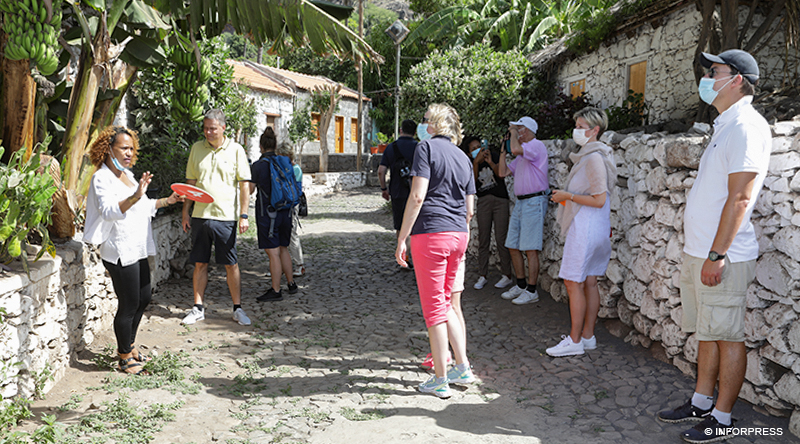Disclaimer:
Please be aware that the content herein has not been peer reviewed. It consists of personal reflections, insights, and learnings of the contributor(s). It may not be exhaustive, nor does it aim to be authoritative knowledge.
Title
Please provide a name for your action learning plan.
Tourism Acceleration (Cidade Velha Pilot)
Challenge statement
Challenge type: If you are working on multiple challenges, please indicate if this is your "big bet" or "exploratory" challenge.
Please note: we ask you to only submit a maximum of 3 challenges - 1x Big Bet, 2x Exploratory. Each challenge must be submitted individually.
BIG BET
Challenge statement: What is your challenge? (Please answer in specific terms: "Our challenge is that...”.)
To accelerate the development of sustainable and green tourism, we need to rethink existing businesses and foster entrepreneurship supported by data and collective intelligence.
Background: What is the history of your challenge? What is causing or driving it? Who is involved? How does the current situation look like? What undesired effects does it produce?
The AccLab's methodology involves a portfolio of experiments for impact studies. Our goal is to conduct experiments in the community of Cidade Velha, located 15 km from the capital city of Praia, to measure impact in the areas of Tourism, Entrepreneurship, and Environment. This village is a UNESCO World Heritage Site and has great potential for tourism in the country.
However, despite frequent visits by tourists, there is no registration or information available about them, such as their origin, language, preferences, and feedback. Tourist services are starting to emerge, but they are not yet prepared and are not focused on tourism. Additionally, there is a lack of entrepreneurship in the area, despite the presence of an IEFP (Instituto de Emprego e Formação Profissional) training center in the village.
To address these issues, our first step is to gather information to plan for change. We aim to collect data on tourism: who visits, how and when they visit, what they look for, and what they think. This information will feed the collective intelligence sessions we want to trigger for business creation and recreation. We will also collect data on the youth population to support the creation and recreation of offerings in the Tourism sector, and on employability, qualifications, and skills to source new businesses through collective intelligence.
Respect for the environment must underpin both tourism and new businesses. We will study the current situation of municipal policies and the state of monuments, tourist attractions, and public paths, to declare the municipality environmentally friendly. The result of this study will be an action plan to declare the first environmentally friendly municipality, and we will provide a scale-up plan for other municipalities to adopt the same policy in the future.
Quantitative evidence: What (official) data sources do you have on this challenge that better exemplifies the importance and urgency of this frontier challenge? You can add text, a link, or a picture.
This project aims to collect and analyze data in three different areas: Tourism, Youth Potential, and Environment. Currently, there is little to no information available about these areas.
To obtain comparative information about tourism, we plan to request data from the Ministry of Tourism regarding cruise ships arriving on the island of Santiago, specifically in the town of Cidade Velha.
For information on the youth population of the city, we will seek the support of the National Institute of Statistics. This will serve as a basis for comparison with the data we collect.
As for the environment, we will rely solely on visual data.
Qualitative evidence: What weak signals have you recently spotted that characterizes its urgency? Please provide qualitative information that better exemplifies the importance and urgency of this frontier challenge. You can add text, a link, or a picture.
Signals that characterize the urgency of this challenge include the lack of tourist services and preparation for tourism in Cidade Velha, despite its potential as a UNESCO World Heritage Site.
Additionally, there is a lack of entrepreneurship in the area, despite efforts in education and training.
Finally, there is a need for environmentally friendly policies to accompany the development of tourism and new businesses in the area.
Investing resources in this challenge is worth it because it has the potential to accelerate the development of sustainable and green tourism in the country, while also promoting entrepreneurship and respecting the environment.
Value proposition: What added value or unique value proposition is your Accelerator Lab bringing to solving this challenge? Why is it your Lab that needs to work on this challenge and not other actors within UNDP, other stakeholders in the country respectively? Why is it worth investing resources to this challenge?
The Accelerator Lab's unique value proposition lies in its focus on data and collective intelligence. This approach informs the creation and recreation of businesses within the tourism sector, and supports the development of environmentally friendly policies.
Short “tweet” summary: We would like to tweet what you are working on, can you summarize your challenge in a maximum of 280 characters?
Accelerating sustainable and green tourism in Cidade Velha through data and collective intelligence, promoting entrepreneurship and respecting the environment. #TourismAcceleration #Entrepreneurship #Environment
Partners
Who are your top 5 partners for this challenge? Please submit from MOST to LEAST important and state Name, Sector and a brief description of the (intended) collaboration.
Please state the name of the Parter:
Ministry of Tourism - Government
National Institute of Statistics - Research
Municipality of Cidade Velha - Government
IEFP - Instituto de Emprego e Formação Profissional - Education and Training
Cidade Velha Associations: Associação de Batucadeiras / Associação de Hiacistas / Centro Cultural / Grupo de Jovens da Igreja Católica
What sector does our partner belong to?
Government (&related)
Please provide a brief description of the collaboration.
Ministry of Tourism - Government: Provides information about cruise ships arriving on the island of Santiago and tourists visiting Cidade Velha. Supports new projects in the tourism industry.~
National Institute of Statistics - Research: Provides information on the youth population of Cidade Velha. Offers partnership and coaching in data gathering.
Municipality of Cidade Velha - Government: The beneficiary of the project. Collaborates on all physical logistics of the project.
IEFP - Instituto de Emprego e Formação Profissional - Education and Training: Collaborates on entrepreneurship development and employability of the youth population.
Is this a new and unusual partner for UNDP?
No
Learning questions
Learning question: What is your learning question for this challenge? What do you need to know or understand to work on your challenge statement?
Youth:
How are the youth of Cidade Velha prepared and equipped to participate in the development of sustainable and green tourism in the area?
What business opportunities can the youth of Cidade Velha offer for the village?
Tourism:
What do tourists look for or what is missing?
Which businesses can be redesigned to orient towards tourism?
Environment:
What are the main drivers and barriers to sustainable and green tourism development in Cidade Velha?
What are the potential impacts of sustainable and green tourism development on the local economy and community?
How can we encourage local businesses to adopt environmentally friendly practices that support sustainable and green tourism in Cidade Velha?
To what stage(s) in the learning cycle does your learning question relate?
Sense, Explore
Usage of methods: Relating to your choice above, how will you use your methods & tools for this learning question? What value do these add in answering your learning question?
Our main goal for this project is data visualization. To achieve this, we will collect mobile phone data, conduct surveys and interviews, and analyze both quantitative and qualitative data. These methods will provide valuable insights into the main drivers and barriers to sustainable and green tourism development in the area, and help us identify new business opportunities.
We have devised a comprehensive plan to conduct Collective Intelligence in several phases. In the initial phase, we will begin by collaborating with the locals to gather their perspectives and insights. This information will aid us in designing a well-rounded data collection process that is tailored to the needs and concerns of the community. Our team will also conduct a thorough review of all available data to gain a deeper understanding of the current state of affairs. As we move forward, we will continue to engage with the community and stakeholders to ensure that we are collecting the most relevant and useful information possible. Additionally, we will analyze the data collected during each phase and use it to refine our approach and improve the accuracy of our findings. With this comprehensive approach, we are confident that we will be able to provide valuable insights that will help inform key decision-makers and promote positive change in the community.
In our project, we will continuously apply solutions mapping with the aim of better understanding the tourism landscape and identifying opportunities for growth. By doing so, we hope to gain a more nuanced understanding of the market and create innovative strategies that will help us capitalize on this potential. In addition, we will make sure to keep up-to-date with the latest trends and developments in the tourism industry, which will inform our approach and enable us to stay ahead of the competition.
Closing
Early leads to grow: Think about the possible grow phase for this challenge - who might benefit from your work on this challenge or who might be the champions in your country that you should inform or collaborate with early on to help you grow this challenge?
This is a prototype with different approaches that we plan to consolidate to be able to replicate them in similar cities in Cape Verde, which have the same tourism potential and are under development.
If we succeed, we intend to replicate it with potential partners such as UNDP, the Ministry of Finance, the Ministry of Tourism, and the beneficiary municipality to conduct surveys and create and reorient businesses.
Regarding the declaration of being an environmentally friendly municipality, we also aim to promote this award to every municipality by changing their use, methodology, and approach to the environment to become more sustainable.
END OF ACTION LEARNING PLAN: Thank you! The form saves automatically and your submission has been recorded. You may now exit this window.
Thank you



 1No poverty
1No poverty 8Decent work and economic growth
8Decent work and economic growth 11Sustainable cities and communities
11Sustainable cities and communities
Comments
Log in to add a comment or reply.